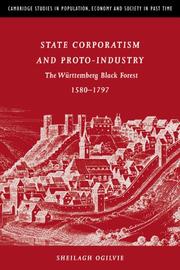| Listing 1 - 2 of 2 |
Sort by
|

ISBN: 0521372097 0521025842 0511582862 0511003986 9780511003981 9780511582868 Year: 1997 Volume: 33 Publisher: Cambridge New York Cambridge University Press
Abstract | Keywords | Export | Availability | Bookmark
 Loading...
Loading...Choose an application
- Reference Manager
- EndNote
- RefWorks (Direct export to RefWorks)
State Corporatism and Proto-Industry focuses on an industrial countryside in south-west Germany, where a dense worsted industry dominated the rural economy from 1580 to 1800. This is an example of 'proto-industry', the dense, export-oriented rural manufacturing which arose throughout Europe before factory industrialization. But although the Württemberg worsted industry possessed all the features of a classic proto-industry, closer scrutiny throws doubt on basic assumptions about European proto-industrialization. In this book, Sheilagh Ogilvie shows that proto-industries did not break down traditional society. Instead, corporate institutions such as guilds, merchant companies, village communities and manorial systems retained enormous power. This was a result of 'state corporatism': the expanding early modern state granted privileges to favoured groups in return for fiscal and regulatory co-operation. As Ogilvie shows, these corporate privileges profoundly constrained both individual decisions and economic development.
Guilds --- Industrialization --- Municipal franchises --- Weavers --- Woolen and worsted manufacture --- Woolen goods industry --- History. --- Tisserands --- Lainages --- Laine --- Corporations --- Industrialisation --- History --- Histoire --- Industrie --- Wildberg (Baden-Württemberg, Germany) --- Wildberg (Bade-Wurtemberg, Allemagne) --- Economic conditions --- Conditions économiques --- Wildberg (Baden-Württemberg, Alemania) --- Condiciones económicas. --- Industria de la madera --- Alemania --- Wildberg (Baden-Württemberg) --- Historia. --- Condiciones sociales. --- Arts and Humanities --- Economic conditions. --- Social conditions.
Book
ISBN: 9781139012058 1139012053 9781139011266 113901126X 9781139011525 1139011529 9780511974410 0511974418 9786613016058 6613016055 9780521764179 0521764173 9780521747929 0521747929 9780521774729 1139012657 1107217199 1283016052 1139011790 1139010999 9781139012652 9781107217195 9781283016056 9781139011792 9781139010993 Year: 2011 Publisher: Cambridge New York Cambridge University Press
Abstract | Keywords | Export | Availability | Bookmark
 Loading...
Loading...Choose an application
- Reference Manager
- EndNote
- RefWorks (Direct export to RefWorks)
"What was the role of merchant guilds in the medieval and early modern economy? Does their wide prevalence and long survival mean they were efficient institutions that benefited the whole economy? Or did they simply offer an effective way for the rich and powerful to increase their wealth, at the expense of outsiders, customers and society as a whole? These privileged associations of businessmen were key institutions in the European economy from 1000 to 1800. Historians debate merchant guilds' role in the Commercial Revolution, economists use them to support theories about institutions and development, and policy-makers view them as prime examples of social capital, with important lessons for modern economies. Sheilagh Ogilvie's magisterial new history of commercial institutions shows how the answers to such questions can help us understand which types of institution made trade grow, why institutions exist, and how corporate privileges affect economic efficiency and human well-being"-- "Cambridge Studies in Economic History comprises stimulating and accessible economic history which actively builds bridges to other disciplines. Books in the series will illuminate why the issues they address are important and interesting, place their findings in a comparative context, and relate their research to wider debates and controversies. The series will combine innovative and exciting new research by younger researchers with new approaches to major issues by senior scholars. It will publish distinguished work regardless of chronological period or geographical location"--
| Listing 1 - 2 of 2 |
Sort by
|

 Search
Search Feedback
Feedback About UniCat
About UniCat  Help
Help News
News